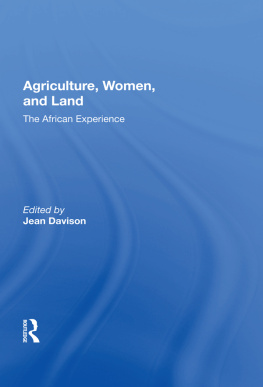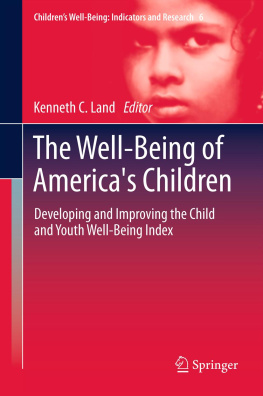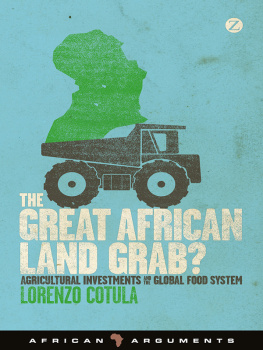Land Ownership and Taxation in American Agriculture
First published 1993 by Westview Press
Published 2018 by Routledge
52 Vanderbilt Avenue, New York, NY 10017
2 Park Square, Milton Park, Abingdon, Oxon OX14 4RN
Routledge is an imprint of the Taylor & Francis Group, an informa business
Copyright 1993 by Taylor & Francis
All rights reserved. No part of this book may be reprinted or reproduced or utilised in any form or by any electronic, mechanical, or other means, now known or hereafter invented, including photocopying and recording, or in any information storage or retrieval system, without permission in writing from the publishers.
Notice:
Product or corporate names may be trademarks or registered trademarks, and are used only for identification and explanation without intent to infringe.
A CIP catalog record for this book is available from the Library of Congress.
ISBN 0-8133-8646-2
ISBN 13: 978-0-367-01108-6 (hbk)
Contents
, Emery N. Castle
PART ONE
Description
, Gene Wunderlich
, Denise M. Rogers
, J. Peter DeBraal
, John Blackledge
PART TWO
Explanation
, Joan M. Youngman
, A. Allan Schmid
, Robert G. Chambers, Hyunok Lee, and John Quiggin
, Paul W. Barkley
, Patrick N. Canning
, Mason Gaffney
, J. Fred Giertz
PART THREE
Options
, Leonard Shabman
, fames Hite
, Alan Harrison
, Ronald J. Oakerson
PART FOUR
Land Information
, John O. Behrens
, Gerard T. Keffer
, Ralph E. Heimlich
, Paul E. Smith
, John P. Michos
Guide
Land economics is one of the most venerable subjects within economics. The classical scholarsSmith, Ricardo, Malthus, Mill, and othersall had a great deal to say about land. They were interested in its contribution to production, in the way it is held, and how its natural attributes affect its social use. The early neoclassical economists, especially Marshall, also had a deep appreciation for the economic and social problems associated with the way land is held and used.
Agricultural economists have also accorded importance to land, and for several decades they have nurtured a subfield of study called land economics. More recently, this specialization has been largely replaced by resource economics. Even though the labels have changed, the basic policy problems associated with land remain.
It is to the credit of Gene Wunderlich and his colleagues in the Economic Research Service that they have recognized the continuing importance of these problems and have done something about it. This 20-chapter anthology is indeed a comprehensive treatment of agricultural land. It is clear that a diligent search was made for the talent necessary to discuss the many dimensions of the social control of land. These dimensions include economics, politics, philosophy, geography, and the law.
Clearly, the subject is a timely one. Because we are a mobile people and live in a changing society, agricultural land use is an important part of the rural landscape. The way that space is used is also of interest to the larger society. The larger society can be expected to reflect its interest through a range of public policies, including but not necessarily limited to, land-use control, taxation, and environmental regulation. This can be expected to heighten interest in those institutions (governing rules, formal and informal) that affect agricultural land. And, of course, the agricultural land area is not fixed over time. It can be expected to change in response to new technology, settlement patterns, and numerous other influences.
Personally, I am pleased that land economics continues to receive attention. Recent work in neoclassical economics has emphasized short-run problems and equilibrium conditions. There has been serious discussion in this context as to whether land economics can be justified as a subject for special study. This argument holds that all factors of production can be reduced to labor and capital and that land should be considered as capital. Such a point of view may be tenable for certain problems, but full acceptance of it would mean that economists would be mute on many of the problems of our time. Land-use controls of various kinds may be crude instruments for the accomplishment of some social objectives, but they may be the only means available to those who wish to influence the use of rural space. It is to the credit of those who decided to produce this volume that they chose not to be mute and influenced and encouraged others accordingly.
Emery N. Castle
Oregon State University
The origins of this volume trace to a 1990 conference on the social collection of rent in the then Soviet Union, sponsored by the Robert Schalkenbach Foundation. In the course of discussions about what converting from a planned to a market economy entails, several of us became aware of real property institutions often taken for granted in the United States. These are the institutions that guide the marketing and allocation of land as an asset, factor of production, and consumption good. We thought a revisit of the American land ownership, tenure, and taxation system would be helpful not only for those seeking a transition from a planned to a market economy but also for those hoping to improve the performance of the American version of a market economy. This volume examines the foundations of the system for owning and taxing agricultural land in the United States.
The U.S. property system of landownership includes hundreds of interests that are created, enforced, adjudicated, and transferred. The economy requires that these interests be easily and efficiently accessed. Specialists in brokerage, appraisal, leasing, regulation, recordation, management, and finance aid in the transfers. Some of the services are separately priced, and the cost of others is imbedded in the price of land. In either case, a property system that assembles, stores, and moves information requires resources. Brokerage fees, insurance premiums, closing expenses, and recording charges give real meaning to the abstraction transaction costs. The property system is not free.
Nor does market price adequately represent all the values implied by our property system. In this volume, we consider the conditions of land policy at several levels of government and question some of the historical views of progress. We examine fundamental features of ownership interests and the nature of valuing and pricing land. We analyze the contracts between those who hold land and those who use it. We even compare the U.S. system to that of Britain, source of many of our institutional roots.
In 1990, the Bureau of the Census had just published the results of a special survey of agricultural landownership, the Agricultural Economics and Land Ownership Survey. That survey produced some unprecedented information on the structure of agricultural landownership and information on trends toward concentrated, nonoperator ownership of farmland. Data from the survey appear in several chapters of this volume. The role of land information at all levels, from aggregative national and state statistics to data on individual parcels, is present throughout this volume. Indeed, we premise a better property system on better information.






